This article is based on the following research article:
Kennette, L. N. & Chapman, M. (2024). Student and faculty perceptions of ineffective teaching behaviours. The Canadian Journal for the Scholarship of Teaching and Learning, 15(1). https://doi.org/10.5206/cjsotlrcacea.2024.1.15148
We all know that effective teaching is crucial for student success, yet understanding what constitutes ineffective teaching is equally important. This month, we delve into a study by Lynne Kennette and Morgan Chapman from Durham College, exploring perceptions of poor teaching behaviours from both students and faculty. Recognizing and addressing these behaviours can significantly enhance teaching quality and student learning experiences.
What Did the Researchers Do and Find?
The authors conducted a survey involving 38 students and 16 faculty members at Durham College in Oshawa, Ontario. They asked both groups to identify the worst teaching behaviours and the most and least frequently encountered ones. The researchers aimed to compare these perceptions with previous studies from the US and China to see if similar patterns emerged.
The study revealed a consensus among students and instructors on the worst teaching behaviours, which included acting disrespectfully, lack of knowledge or clarity, being unapproachable, and displaying disinterest in teaching. Interestingly, both groups agreed on the most and least frequently occurring behaviours at their institution. The findings also highlighted a shift in teaching dynamics due to the COVID-19 pandemic, with new challenges emerging in online and hybrid learning environments.
How might you use this research in your teaching?
University instructors can leverage these insights by reflecting on their teaching practices and identifying areas for improvement. Understanding the specific behaviours that students and colleagues find detrimental can guide professional development and pedagogical adjustments. For instance, prioritizing clear communication, being approachable, and showing enthusiasm for teaching can enhance the overall learning environment.
Additionally, professors can benefit from fostering a learner-centred approach, encouraging active participation, and promoting metacognition and collaboration among students. By addressing these key areas, professors can create a more engaging and effective educational experience, ultimately leading to better student outcomes and satisfaction.
This research can help us to explore our teaching reflexively. Not only do we need to think about what we are doing effectively in our teaching practice, but we also must consider what may be problematic in our approaches, and learn to adjust.
]]>President David Farrar, Vice-Provost, Teaching and Learning Kim Dej, and Director of the MacPherson Institute Lori Goff hosted the 2024 President’s Retreat on Monday, June 17. The event celebrated the winners of the President’s Award for Outstanding Contributions to Teaching and Learning at McMaster.
Award Winners
- Sean Park, Assistant Professor, Medicine
- Nikol Piskuric, Associate Professor, Psychology, Neuroscience & Behaviour
- Bruce Wainman, Professor, Pathology & Molecular Medicine
Award Nominators
- Michelle MacDonald, Associate Professor, Biochemistry & Biomedical Sciences
- Mel Rutherford, Professor, Psychology, Neuroscience & Behaviour
- Cheryl Main, Professor, Pathology & Molecular Medicine
A selection of photos from the event are shared below.
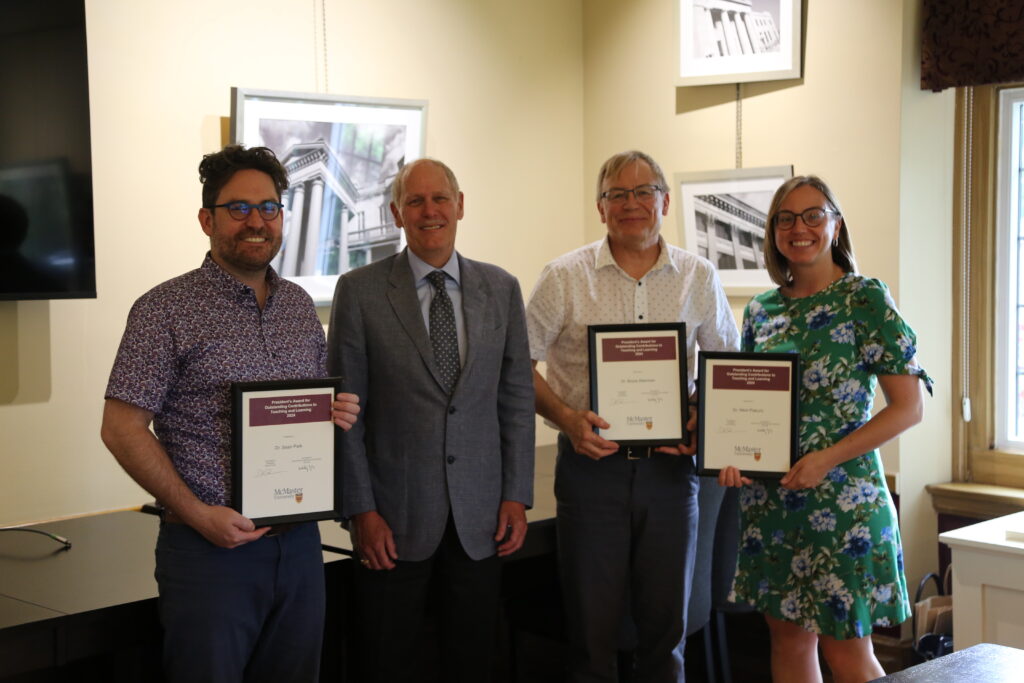
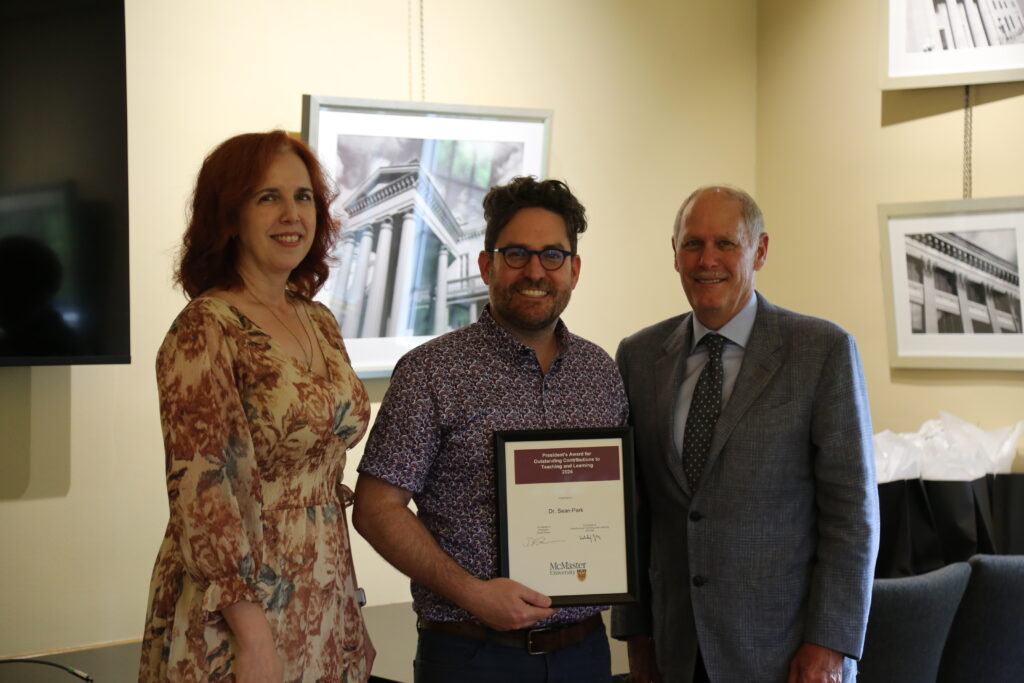
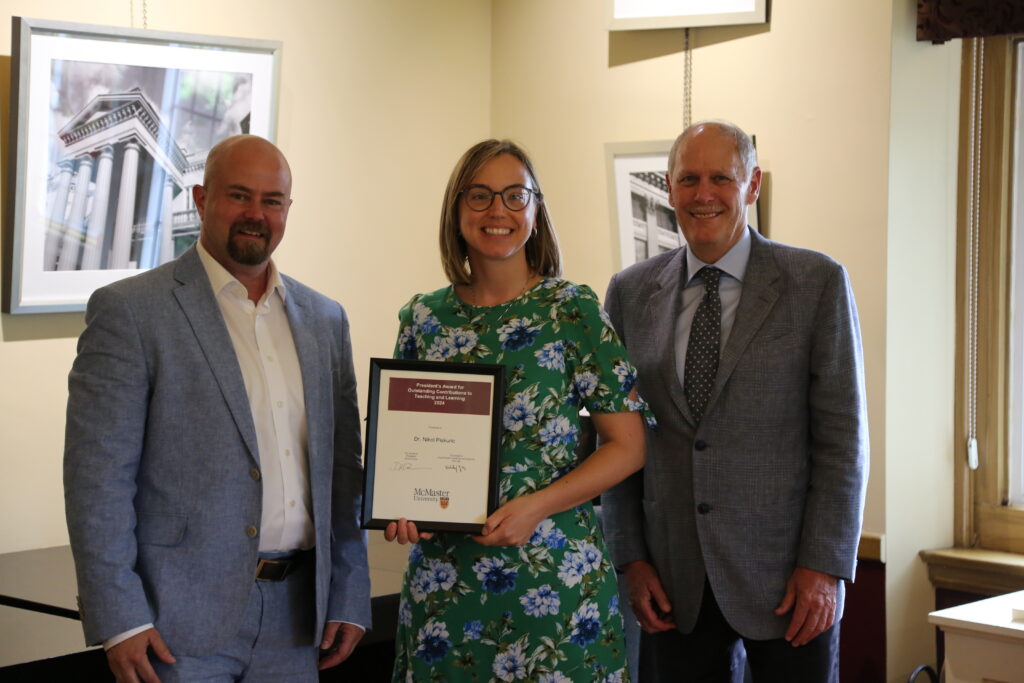
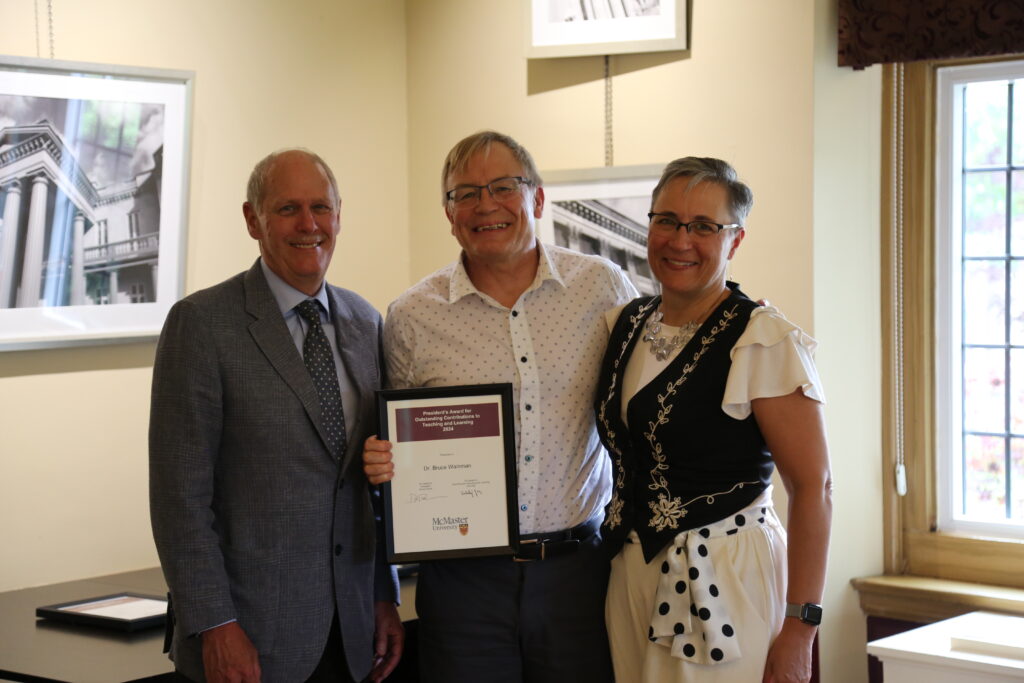
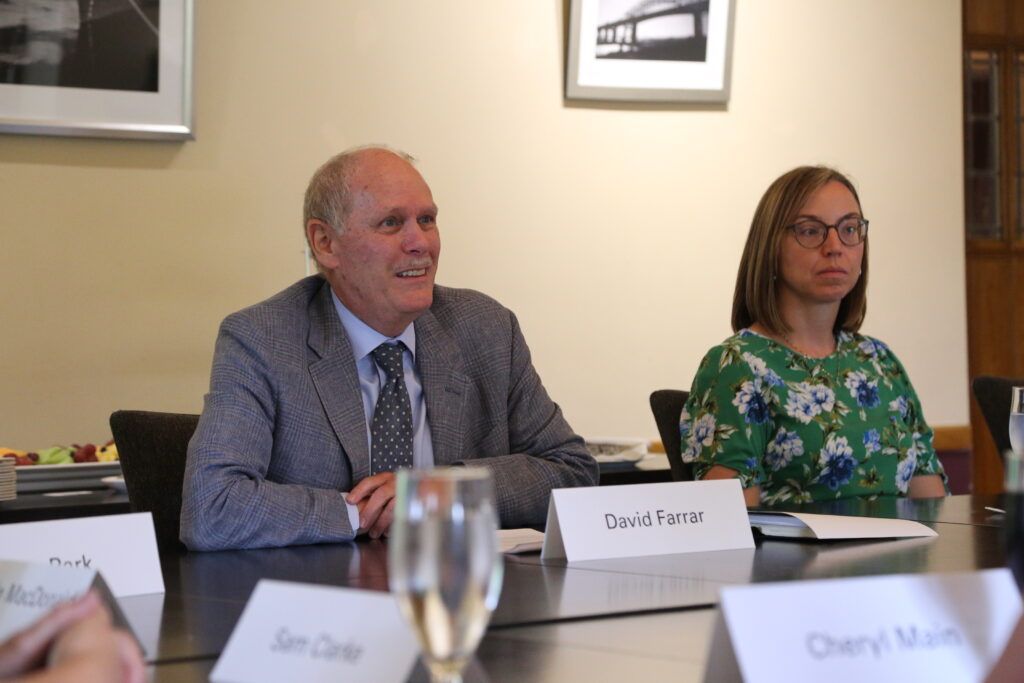
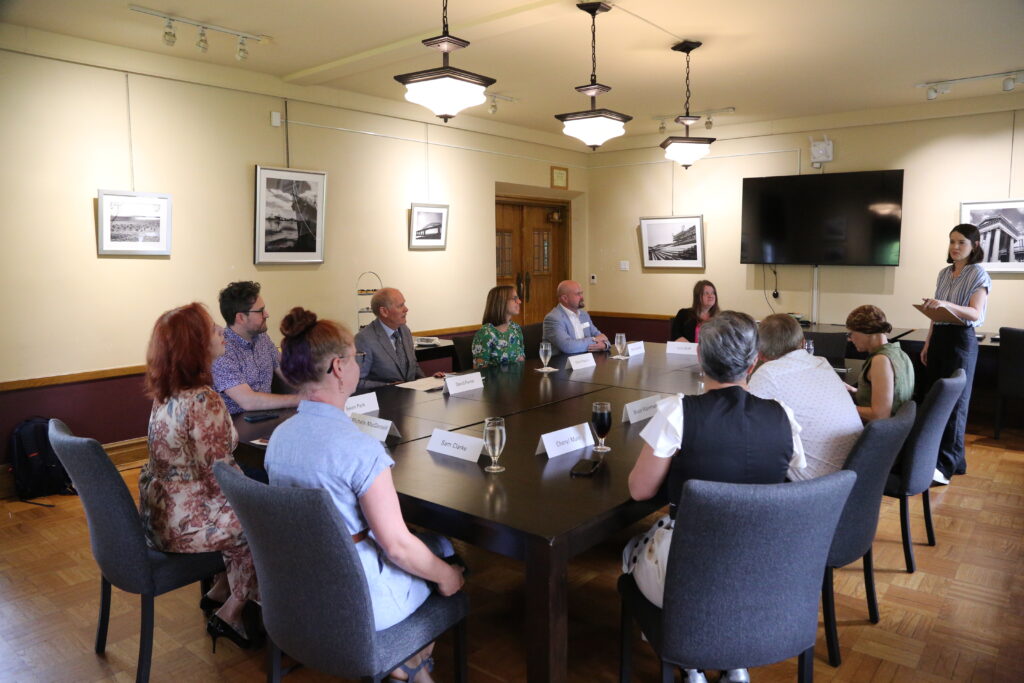


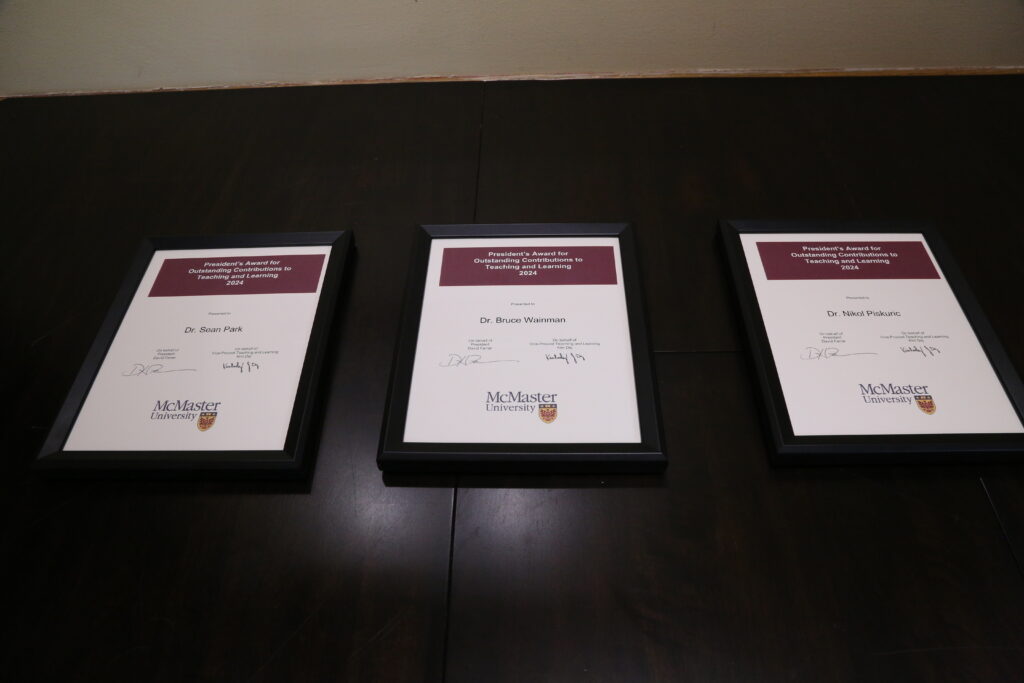
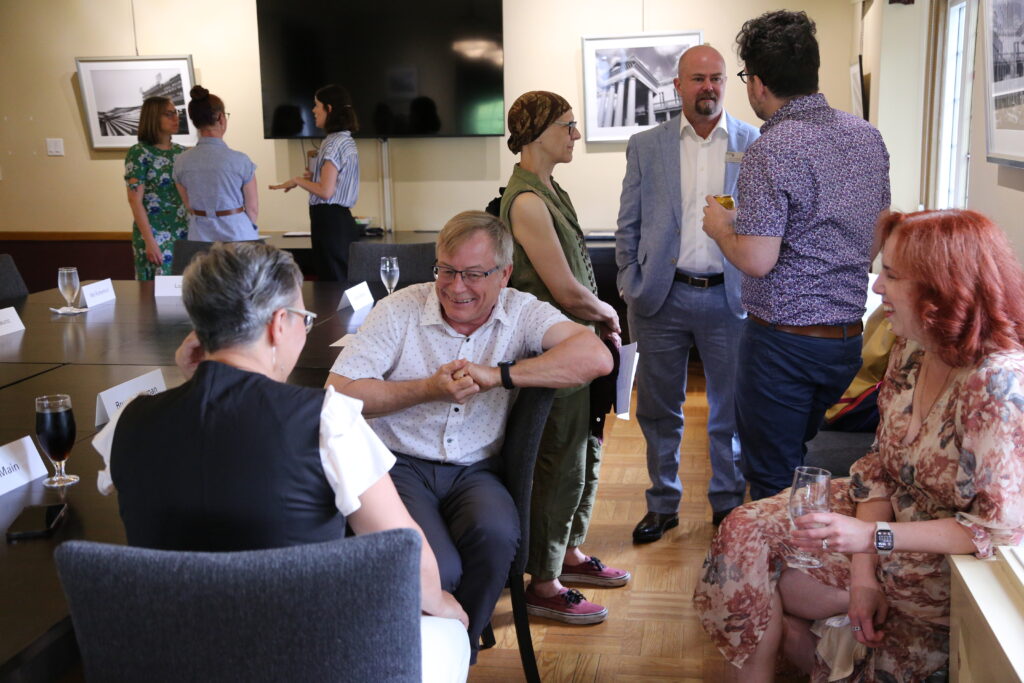 ]]>
]]>The post-secondary experience can be a transformative period in an adolescent’s lifetime. While students are busy absorbing knowledge, discovering new passions and considering their future careers, they may not realize their unique perspectives can be a powerful tool in shaping and enhancing the teaching and learning experience.
Former McMaster undergraduate students Zoya Adeel, Adina Silver and Stefan Mladjenovic had the opportunity to partner on several research projects with Katie Moisse, an assistant professor in the Faculty of Science beginning in 2019. Their experiences changed the way they think about the student experience, bolstered their self-confidence and helped shape their future aspirations and careers.
The Projects
In 2020, Moisse, who has a background in both science and journalism, was awarded the Leadership in Teaching and Learning Fellowship to support a research project evaluating science communication training in the School of Interdisciplinary Science (SIS). Moisse and her colleague, professor Sarah Symons, would examine existing science communication courses, propose new offerings and seek feedback from students as part of their work in the study.
In 2022, Moisse and colleague, Tahmina Shamsheri were awarded the IDEAS (Inclusivity, Diversity, Equity, Accessibility and Sustainability) Grant to support a project that would examine the impact of hybrid-flexible (HyFlex) learning environments on student engagement and success. This research would also look at the impact of embedding meaningful opportunities for students to critique science and science communication through an equity and inclusion lens.
For both research projects Moisse used portions of her grant funding to hire students who would help provide important learner perspectives and assist with the research and data analysis work.
The Experience

Stefan Mladjenovic, a former undergraduate student in the Life Sciences program, had the opportunity to work with Moisse as a student partner on the HyFlex learning environments research project and highlighted the importance of empathy from both the student and the instructor perspectives throughout the process.
“Katie is a hard-working, intelligent, and exceptionally empathic mentor and educator,” said Mladjenovic, who is now a PhD candidate at the University of Toronto in the Biomedical Engineering program. “Being a student that analyzes data on student learning experiences, also gives us a uniquely empathic perspective throughout the research process.”

While working as a student partner on both the HyFlex research project and science communication project, Zoya Adeel highlighted the significant impact the partnership experience had on her academic and professional trajectories.
“Like many science students, I considered pursuing professional school but when I started working with Katie, and became interested
in science communication and pedagogical research, that changed,” said Adeel, who is now a master’s student at McMaster in Biochemistry and Biomedical Sciences. “Katie’s curiosity is contagious. It was her curiosity and passion for research that inspired me to take on my current role as a graduate researcher in a cancer immunotherapy lab.”
Adina Silver acknowledged Moisse’s ability to work comfortably in partnership with her students—where everyone’s thoughts and ideas are recognized and appreciated.
“One of the most significant impacts Katie has had on me is in the confidence she’s instilled. She has this incredible ability to validate your thoughts and opinions,” said Silver, who continues to support Moisse with her research while working at a non-profit organization. “You’ll have an idea and feel intimidated to share it, but she has an incredible way of validating and expanding on it. You gain confidence in sharing your opinions and ideas, while learning from her perspective and experience.”
The Impact
The constant exchange of ideas mixed with mentorship fuels a mutually beneficial relationship that has laid the groundwork for future course enhancements through Moisse’s research and set in motion new pathways, both academically and professionally, for Adeel, Silver and Mladjenovic.
The research they participated in has now been published. Adeel and Mladjenovic co-authored an article titled Student Engagement Tracks with Success In-Person and Online in a Hybrid-Flexible Course, which looked at student perceptions and experiences with a hybrid-flexible teaching and learning environment—a study that began before the pandemic. Silver and Adeel contributed to publishing an article titled Weaving Science Communication Training through an Undergraduate Science Program with a Focus on Accessibility and Inclusion, which examined the use of science communication training in science programs to help strengthen science literacy and preserve public trust in science.
These articles represent something tangible that Adeel, Silver and Mladjenovic can take away from their work as student partners, but the experience of working with Moisse is what has left the most lasting impact.
“Having her as my mentor was crucial in developing my confidence in professional contexts. I can unequivocally say that she’s changed the trajectory of my career,” said Adeel.
—-
There are many types of student partnership that exist at McMaster. The Student Partners Program (SPP) is one opportunity that enables undergraduate and graduate students to participate as partners with faculty, instructors and staff on projects that contribute to the enhancement of teaching and learning at McMaster.
Interested to learn more about Student Partnership?
Register to attend the upcoming Students as Partners Community Forum on June 26. The Community Forum is an in-person event held for the first time at McMaster University this year. The event will feature a diverse range of activities including a student panel, roundtable discussions, and networking sessions. Attend to hear more experiences and insights related to student-faculty partnerships from unique contexts.
]]>This article is based on the following research article:
Gandarilla Ocampo, M., & Asher BlackDeer, A. (2022). We Deserve to Thrive: Transforming the Social Work Academy to Better Support Black, Indigenous, and Person of Color (BIPOC) Doctoral Students. Advances in Social Work, 22(2), 703–719. https://doi.org/10.18060/24987
Is graduate supervision a key facet of teaching and learning? What are the supervisory practices that might impact Black, Indigenous, and People of Colour (BIPOC) graduate students as supported and successful future scholars? The authors provide a timely analysis on the ways in which BIPOC graduate students might navigate complex dynamics based on teaching practices and supervisory support. Their reflection questions and recommendations are useful for all graduate supervisors (regardless of discipline) and at various levels of teaching and learning.
What did the researchers do and find?
This article responds to institutional pivots to strategically promote equity, diversity, and inclusion (EDI) across universities post-2020. Authors María Gandarilla Ocampo and Autumn Asher BlackDeer turn to the experiences of BIPOC doctoral students to provide an autoethnographic – a self-reflexive method – analysis of doctoral programs and supervisory practices. Reflecting on what they describe as “the most significant relationships for a student in doctoral education – the advisor/advisee or mentor/mentee relationship” (707), the authors consider the ways in which racism arises in supervisory support, or the lack thereof. In turn, the key contribution of this article is a list of implications, reflections, and recommendations to address the complicated nature of supervising and supporting BIPOC doctoral students.
How might you use this research in your teaching?
The authors provide a comprehensive table of reflection questions to instill in your approach to graduate supervision as a teaching practice. Using the table (715-716), you might assess your doctoral supervision practices using the four needs listed:
- Educational environment that is inclusive: Do your teaching and supervisory practices intentionally take on an anti-racist, anti-oppressive & decolonial approach?
- Tailored support: Do you meet students where your students are at?
- Academic institutions free from all forms of oppression: Do you mentor BIPOC students in ways that actively combat discriminatory methods?
- Concrete and formal supports to navigate the academy: Do you know what concrete & formal supports BIPOC students need to thrive?
In turn, your supervision might adopt the recommendations outlined by the authors. For example, exploring how your supervision could address the need for tailored support requires crafting a supervision practice with formalized plans, avenues, and collaborations to support BIPOC graduate students across their time as your advisee.
Stay tuned for the next Spotlight on SoTL coming to the MacPherson Memo on July 3, 2024
]]>Dr. Anita Acai is an Assistant Professor in the Department of Psychiatry and Behavioural Neurosciences and a Scientist with the McMaster Education Research, Innovation and Theory (MERIT) Program. She is also an Associate Member of the Department of Psychology, Neuroscience & Behaviour at McMaster University, as well as an Education Scientist at St. Joseph’s Education & Research Centre (SERC).
An important focus of Acai’s research work has involved addressing healthcare challenges through education. As the 2024 Petro-Canada Young Innovator Award winner, she will expand on this work with a pilot study to evaluate the feasibility and effectiveness of VR training, specifically targeting improvements in knowledge and confidence levels among hospital learners and staff in managing violent incidents.
“Dr. Acai is making an impact as an education researcher. Her expertise in quantitative and qualitative methodologies allows her to meaningfully tackle the complex and messy problems facing health professions education. MERIT and the McMaster community benefit from her collaborations,” said Jonathan Sherbino, Assistant Dean of McMaster Education Research, Innovation & Theory (MERIT) Program.
Recognizing the need for innovative solutions to address “code white” challenges Acai and her team, which includes Drs. Gary Chaimowitz and Azim Gangji, are launching this collaborative study between St. Joseph’s Healthcare Hamilton (SJHH), the St. Joseph’s Education & Research Centre (SERC) and the Department of Psychiatry and Behavioural Neurosciences at McMaster University that will explore the potential of virtual reality (VR) technology in revolutionizing code white training in the hospital setting.
“The mission of St. Joseph’s Education & Research Centre (SERC) is to advance hospital-based education research, showcasing St. Joe’s as a leader in education and education scholarship,” said Azim Gangji, Vice President Education St Joseph’s Healthcare Hamilton. “We are grateful to have Dr. Acai as SERC’s inaugural education scientist. This award highlights her accomplishments and creates opportunities for learners to continue contributing to impactful and innovative work in the healthcare setting.”
The team has collaborated with an educational technology company to create immersive VR scenarios tailored for training purposes. These scenarios facilitate lifelike, interactive experiences between the user and the virtual environment. With a VR headset and controllers, users will have the freedom to navigate through virtual settings, encountering simulated patients with whom they can interact.
Acai will lean on her established role as a student mentor and leader to include a significant student voice in this work. Her leadership contributions to the scholarship of teaching and learning, particularly in students-as-partners work, have garnered national and international recognition.
“Student partnership is incredibly important to us at McMaster,” said Lori Goff, Director of the MacPherson Institute, “Anita Acai already has an impressive history as a flourishing leader and as an award-winning mentor to more than 60 students in various capacities in just a few years as a faculty member. We are thrilled to see her bring this enthusiasm for partnership to an innovative virtual reality research project that could have a direct impact on the student learning experience.”
Funds from the award provide an opportunity for researchers to garner student participation in a research activity that generates campus-wide recognition for innovative research achievement. The award is financed through a $250,000 endowment provided by Petro-Canada, and a matching annual contribution provided by McMaster University’s Office of the Vice-President Research. Each Faculty is invited to submit one nomination.
To learn more about past winners and their funded projects, visit the Petro-Canada Young Innovator Award webpage.
]]>Applications are open for a popular grant program that makes it easier for McMaster University instructors to create, adapt and adopt free, high-quality open textbooks and course materials to improve teaching and learning.
The McMaster Open Educational Resources (OER) Grant Program is supported by the Office of the Provost, McMaster University Library, McMaster Students Union, and the MacPherson Institute. It provides successful applicants with funding to create new OER or to adopt or customize existing OER. This means cost savings for students. The program also offers an honorarium for instructors to peer review existing OER.
“The OER grants provide support for McMaster instructors as they integrate OER into their courses,” said Katie Harding, teaching and learning librarian, OER and STEM at McMaster University Library. “The different grant types ensure that there’s flexibility for instructors to use OER in the ways that work for them.”
Part of the global Open Access movement, OER are teaching, learning and research materials that can be used, shared or modified based on their open-licence permissions.
The McMaster grant program was created to increase instructors’ awareness of these resources and encourage exploration of new teaching approaches. Starting in 2023, the program’s funding was doubled for three years, making $60,000 available annually.
“Tapping into the flexibility OER offer teaching and learning is a win-win scenario,” said Joanne Kehoe, lead educational developer, digital pedagogies at the MacPherson Institute. “OER offers a way for instructors to easily contextualize and localize their content, while at the same time removes financial barriers that students experience in accessing course materials. To date, we estimate this program has saved McMaster students more than $700,000.”
The call for proposals for 2024-25 offers three levels of OER grants and an honorarium, including an adoption grant (up to $1,000 each); adaptation grant (up to $2,500 each); creation grant (up to $7,500 each), and a peer review honorarium ($250).
How to apply
Applications for the 2024-25 McMaster OER Grant Program opened on April 8, 2024. The deadline to apply is May 31, 2024 by 11:59 p.m.
Learn more about the OER Grant Program at an information session happening on Monday, May 13 from 11:30 a.m.-12 p.m. during MacPherson’s May teaching and learning month.
To register, visit the May teaching and learning month Zoom events page.
]]>This article is based on the following research article:
Highland, K. D., & Fedtke, J. (2023). Rethinking the essay: Student perceptions of collaborative digital multimodal composition in the college classroom. Higher Education Pedagogies, 8(1), 2216194. Doi: https://doi.org/10.1080/23752696.2023.2216194
The essay has remained a staple in learning institutions across the globe from high school to post-secondary education. But just how relevant are they in our modern digital world? Researchers Kristen Highland and Jana Fedtke challenged the traditional essay by offering students a collaborative digital multi-modal composition project.
What did the researchers do and find?
Highland and Fedtke examined student experience in two advanced undergraduate literature courses in which a collaborative digital multimodal writing project was used in place of a traditional written essay. Students were asked to work collaboratively to develop and write their arguments, incorporating multimedia sources such as video, images, and music in addition to course texts and scholarly secondary sources. The project was completed using Scalar, a digital multimodal writing platform that allows for diverse ways of organising information, including the ability to incorporate image, sound, and video texts.
The authors collected data on student experiences through an open-ended and anonymous written reflection designed to elicit their perceptions of the purposes, processes, and value of this project in relation to a traditional essay. Students identified creativity as an enjoyable and generative aspect of the project, expressing how it allowed them to exert more ownership over their ideas and facilitate a more personal relationship with their work. Additionally, students expressed how the project impacted their ability to make new analytical connections between texts and ideas, as well as think about evidence and relevance in a broader way. While some students were frustrated at the Scalar software, expressed comfort with the traditional essay format, and were reluctant to participate in group work, the project satisfied students’ desire for digital integration in their undergraduate education and improved learning outcomes through the collaboration and integration of diverse ideas.
How might you use this research in your teaching?
As instructors, it can be easy to default to longstanding established evaluation tools like the traditional essay, but it’s important to challenge how and why we use these assignments, as well as their impact on student learning. Alternatives to traditional essays can offer a myriad of benefits that cater to diverse learning preferences, foster creativity, encourage collaboration, improve learning outcomes, and better prepare students for the complexities of the real world. While valuable in their own right, traditional essays may fail to capture the range of abilities and talents students possess. Integrating alternative assignments into the classroom allows students to interact with the material in different and often more relevant ways. This diversified approach promotes critical thinking, collaboration, and communication of ideas, which are essential skills in today’s interconnected and digital society. The adoption of alternative assessments reflects a commitment to holistic and student-centred education, enriching the learning experience of students by allowing them to interact with learning material in new and unique ways beyond the traditional essay.
For more ideas around other assessment approaches, see Beyond the Exam: An Alternative Online Assessment Toolkit, a collaborative project between Brock University, College Boreal and McMaster University, and was made possible with funding by the Government of Ontario and through eCampusOntario’s support of the Virtual Learning Strategy.
]]>This article is based on the following research article:
Adeel, Z., Mladjenovic, S. M., Smith, S. J., Sahi, P., Dhand, A., Williams-Habibi, S., Brown, K., & Moisse, K. (2023). Student engagement tracks with success in-person and online in a hybrid-flexible course. The Canadian Journal for the Scholarship of Teaching and Learning, 14(2). https://doi.org/10.5206/cjsotlrcacea.2023.2.14482
The HyFlex model – that is, where students can attend synchronous class either physically or virtually – can provide the flexibility that is preferred and necessary for students without impacting the learning experience or creating more work for instructors. Led by Dr. Katie Moisse from the School of Interdisciplinary Science, researchers at McMaster University implemented a HyFlex model in content-based and skills-based Life Sciences courses. In a HyFlex model, students were required to participate synchronously, regardless of whether they joined in-person or online. The study found that virtual learning does not negatively impact student performance or lecture attendance.
What did the researchers do and find?
Both courses required students to participate synchronously, but gave the choice to attend virtually or in-person. Students could choose either attendance option every week. The study found no difference in engagement and final-grades between those who either preferred in-person or online lectures. In other words, virtual learning does not negatively impact student performance or lecture attendance. The researchers found that students stated that having activity slides and the ability to replay lectures could support their learning. The HyFlex model supports accommodations as most respondents had at least one flexible learning need. These barriers include lack of transportation, time preference for studying, and employment hours. Overall, the HyFlex model can provide the flexibility that is preferred and necessary for students without impacting the learning experience or creating more work for instructors.
How might you use this research in your teaching?
Here are a few ways you can support and easily implement HyFlex model in your class:
- Allocate 4-5% marks towards lecture attendance and participation for either modality to encourage students to take part in classroom activities.
- Add 4-8 activity slides per lecture for interactivity during the lecture.
- Assign prep work prior to class (ex. Required readings or video) to measure student progress towards learning outcomes.
- Ask for volunteers to create a small group of in-person students to monitor online discussion boards and speak up on behalf of their online peers.
In addition to this, Echo360 is available in 91 classrooms at McMaster University, and has the added feature of automatic uploading and transcription, reducing work for instructors. The team in the Campus Classroom Technologies (CCT) unit can support you in learning and applying this technology.
Stay tuned for the next Spotlight on SoTL coming to the MacPherson Memo on May 1, 2024.
]]>Open Education Resources (OER) promote equitable access to education and redefine teaching and learning by providing free, accessible, customizable, high-quality educational content.
One of the biggest barriers to faculty adopting and using Open Educational Resources (OER) in their courses is finding what is available and suitable for their teaching context. The updated OER by Discipline Guide, developed as part of a collaboration between the MacPherson Institute and the McMaster University Library, seeks to address that barrier by including an abundance of open textbooks and other OER organized by undergraduate programs at McMaster University.
These academic programs span the Faculties of Science, Social Science, Humanities, Engineering, Business and, newly added, Health Sciences.
The guide features OER carefully selected from various sources, such as the Ontario Open Library and other open textbook collections, including OER Commons and Open Textbook Library.
The guide also highlights OER that have been created by McMaster faculty, instructors and staff members. These projects were largely enabled via funding through McMaster’s OER Grant and eCampusOntario’s Virtual Learning Strategy.
“We recognize that our instructors are keen to explore more affordable course materials for their students but are challenged with finding suitable open options,” said Joanne Kehoe, lead educational developer at the MacPherson Institute and McMaster OER Committee co-chair. “We hope that this resource will kickstart the possibilities that OER offer—not only around affordability, but also providing the opportunity to adopt an OER and customize it to suit teaching and learning goals.”
Zhen He, assistant professor, Economics and former OER grant recipient, agrees. “I was able to adapt an existing open educational resource by creating a question bank in collaboration with my students. This presented a wonderful opportunity to practice open pedagogical practice and create openly-licenses materials specifically targeted to my course.”
Over this past year, He has acted as an eCampusOntario OER Ranger. The OER Ranger program selects representatives from each of Ontario’s publicly-assisted college, university, or Indigenous Institutes to champion the use of OER in their institutions. Shelir Ebrahimi, an assistant professor in Chemical Engineering at McMaster, was also selected for the Ranger program.
“Creating an OER for my course as well as incorporating open pedagogical practices has transformed my teaching for the better, and at the same time has supported the learning experience of students greatly,” said Shelir. “I hope that instructors engage with this updated guide as a way of enhancing the student experience by uniquely aligning materials to their course, while at the same time making it more affordable and accessible.”
Most of these OER are peer-reviewed, and many have been adopted and used in classrooms worldwide, indicating their quality and relevance to contemporary educational needs. Instructors have the flexibility to customize the materials to suit their teaching and learning context, whether by using the entire textbook or selecting specific chapters for supplementary course material.
Read more about OER at McMaster University at the Library Research Guide. If you have any questions about using OER in your teaching and learning, please reach out to: [email protected].
]]>